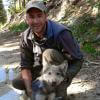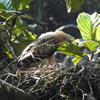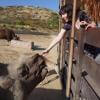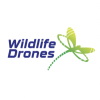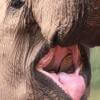With new technologies revolutionizing data collection, wildlife researchers are becoming increasingly able to collect data at much higher volumes than ever before. Now we are facing the challenges of putting this information to use, bringing the science of big data into the conservation arena. With the help of machine learning tools, this area holds immense potential for conservation practices. The applications range from online trafficking alerts to species-specific early warning systems to efficient movement and biodiversity monitoring and beyond.
However, the process of building effective machine learning tools depends upon large amounts of standardized training data, and conservationists currently lack an established system for standardization. How to best develop such a system and incentivize data sharing are questions at the forefront of this work. There are currently multiple AI-based conservation initiatives, including Wildlife Insights and WildBook, that are pioneering applications on this front.
This group is the perfect place to ask all your AI-related questions, no matter your skill level or previous familiarity! You'll find resources, meet other members with similar questions and experts who can answer them, and engage in exciting collaborative opportunities together.
Just getting started with AI in conservation? Check out our introduction tutorial, How Do I Train My First Machine Learning Model? with Daniel Situnayake, and our Virtual Meetup on Big Data. If you're coming from the more technical side of AI/ML, Sara Beery runs an AI for Conservation slack channel that might be of interest. Message her for an invite.
Header Image: Dr Claire Burke / @CBurkeSci

Explore the Basics: AI
Understanding the possibilities for incorporating new technology into your work can feel overwhelming. With so many tools available, so many resources to keep up with, and so many innovative projects happening around the world and in our community, it's easy to lose sight of how and why these new technologies matter, and how they can be practically applied to your projects.
Machine learning has huge potential in conservation tech, and its applications are growing every day! But the tradeoff of that potential is a big learning curve - or so it seems to those starting out with this powerful tool!
To help you explore the potential of AI (and prepare for some of our upcoming AI-themed events!), we've compiled simple, key resources, conversations, and videos to highlight the possibilities:
Three Resources for Beginners:
- Everything I know about Machine Learning and Camera Traps, Dan Morris | Resource library, camera traps, machine learning
- Using Computer Vision to Protect Endangered Species, Kasim Rafiq | Machine learning, data analysis, big cats
- Resource: WildID | WildID
Three Forum Threads for Beginners:
- I made an open-source tool to help you sort camera trap images | Petar Gyurov, Camera Traps
- Batch / Automated Cloud Processing | Chris Nicolas, Acoustic Monitoring
- Looking for help with camera trapping for Jaguars: Software for species ID and database building | Carmina Gutierrez, AI for Conservation
Three Tutorials for Beginners:
- How do I get started using machine learning for my camera traps? | Sara Beery, Tech Tutors
- How do I train my first machine learning model? | Daniel Situnayake, Tech Tutors
- Big Data in Conservation | Dave Thau, Dan Morris, Sarah Davidson, Virtual Meetups
Want to know more about AI, or have your specific machine learning questions answered by experts in the WILDLABS community? Make sure you join the conversation in our AI for Conservation group!
No showcases have been added to this group yet.
- 0 Resources
- 0 Discussions
- 13 Groups
Botswana Predator Conservation Trust


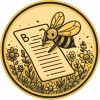
- 0 Resources
- 85 Discussions
- 10 Groups
- @Tysmucker
- | He/Him
Wildlife Biologist/Conflict Specialist and drone enthusiast in Montana
- 0 Resources
- 0 Discussions
- 5 Groups

- 0 Resources
- 0 Discussions
- 4 Groups
Tropical ecologist working on community ecology and citizen science with ants as main research models
- 0 Resources
- 0 Discussions
- 5 Groups
- @iska1818
- | iska
nature nerd, leopard and eagle lover
- 0 Resources
- 0 Discussions
- 6 Groups
- 0 Resources
- 1 Discussions
- 3 Groups
- @roboticscats
- | He / him / his
Founder & CEO of RoboticsCats, a machine vision startup. Our AI wildfire detection SaaS is protecting forests & communities in Asia, Europe & LATAM.
- 0 Resources
- 1 Discussions
- 3 Groups
- @kalado
- | Kalado
I am Brazilian and a software developer. I have 20 years of experience in the field and I am currently the CTO of Log Nature, a company specialized in creating solutions for the environmental sector.
- 0 Resources
- 1 Discussions
- 8 Groups
I work in conservation on integrating the technology out there for custom solutions for partners.
- 0 Resources
- 0 Discussions
- 22 Groups
Postdoc researcher -- engineering for biodiversity conservation
- 0 Resources
- 2 Discussions
- 1 Groups
- @adanger24
- | She/Her
Arribada Initiative
Senior Project Manager and Field Specialist


- 2 Resources
- 16 Discussions
- 10 Groups
This project is part of the Conservation AI Network. We aim to help threatened species & manage invasive species using leading edge analytics and artificial intelligence algorithms. The primary purpose of the...
29 August 2022
Boost cons tech capacity at an international NGO! Fauna & Flora International is offering a paid three-month internship to consolidate and share best practices for the application of emerging hardware and software...
26 August 2022
The Department of Wildlife, Fish, and Environmental Studies (WFE), SLU, Umeå, is looking for a postdoc with strong interests in wildlife conservation technology.
26 August 2022
Article
An update on Ceres Tags products that are being used in conservation
22 August 2022
Careers
Job opening at ARISE, an innovative program in the Netherlands to build a digital infrastructure for biodiversity data and services
19 August 2022
Are you creative, love new challenges and have experience developing software? The Wildlife Insights team is hiring! Join a diverse team of ecologists, data scientists, engineers and machine learning experts to protect...
10 August 2022
The Marine Robotics and Remote Sensing (MaRRS) Lab at Duke University seeks a highly motivated UAS pilot and geospatial analyst to support the ongoing development of new and existing research and conservation programs,...
10 August 2022
Hi folks! I built out a human-in-the-loop annotation platform for Felidae Conservation Fund, a SF-Bay Area nonprofit last Fall using MegaDetector. I'm looking for feedback from this amazing community around areas of...
10 August 2022
The Marine Robotics and Remote Sensing (MaRRS) Lab at Duke University seeks a highly motivated postdoctoral researcher to support the ongoing development of new and existing research and conservation programs, both...
10 August 2022
Interesting thought piece from Mark Minevitch (AI for Good) et al. on the promise of AI and other ICT innovation to deliver on climate challenges, existing ICT sector emissions - and the three types of carbon lock-in...
8 August 2022
Press Release for International Tiger Day – July 29th, 2022: For the first time ever, wild tigers and their prey have been detected by AI-powered, cryptic cameras that transmit the images to the cell phones and...
5 August 2022
Article
A gentle introduction to the exciting field of embedded machine learning.
5 August 2022
August 2025
event
September 2025
event
event
event
event
October 2025
event
event
event
December 2025
event
March 2026
May 2023
event
April 2023
17 Products
Recently updated products
| Description | Activity | Replies | Groups | Updated |
|---|---|---|---|---|
| This works very well, and can remove the movie strip icons from the edges of the thumbnails, which obscure animals just coming into the frame. https://icaros.en.softonic... |
|
AI for Conservation | 4 years 6 months ago | |
| Dan's comments about the need for technologists and conservationists to manage and share (properly annotated) data struck a chord with me, it was right at the end of the... |
|
AI for Conservation, Data management and processing tools | 4 years 6 months ago | |
| Hi Alex, that sounds great! Feel free to email me at luisa.teixeira@vizzuality.com, that may be simpler. |
|
AI for Conservation | 4 years 6 months ago | |
| Hi. Just watched the Youtube version (I'm in the unable to watch live hemisphere) and wanted to say that was a great talk. I wish it could have gone for another hour. I liked... |
|
AI for Conservation, Camera Traps | 4 years 6 months ago | |
| The IUCN Otter Specialist Group is hosting a Virtual Eurasian Otter Workshop on 26-28.February.2021. There will be invited talks and... |
|
AI for Conservation, Camera Traps, eDNA & Genomics | 4 years 6 months ago | |
| I know I'm very late, but I only discovered this recently. Is your team still active/accepting new members? |
+24
|
AI for Conservation | 4 years 7 months ago | |
| Hi @pmnguyen1224 , thanks for reaching out and checking out the system! We would love to help ensure that you're able to get pattern matching to work for... |
|
Acoustics, AI for Conservation | 4 years 7 months ago | |
| Hi Andrew, Yo need to train a lightweight DNN model for bird flocks which can then be deployed on Raspberry Pi. For initial starters, you can look into the below tutorial:... |
|
AI for Conservation | 4 years 8 months ago | |
| This is great, thanks for sharing. |
|
AI for Conservation | 4 years 9 months ago | |
| Dear Zoe, I wonder whether FIT would be good for species-level (rather than individual level) identification of small mammals. We use track tunnels to get prints of dormice (3... |
|
AI for Conservation, Emerging Tech | 4 years 9 months ago | |
| AI for Climate Forum: Lightning Talks Bonnie Lei, Microsoft AI for Earth - 4pm GMT, October 30 Register here: https://us02web.zoom.us/webinar/register/... |
|
AI for Conservation | 4 years 9 months ago | |
| Hi Wildlabbers, Just popping in to share this very cool primer for beginners to embedded machine learning from our tutor Daniel Situnayake! If you're interested in... |
|
AI for Conservation, Camera Traps | 4 years 10 months ago |



